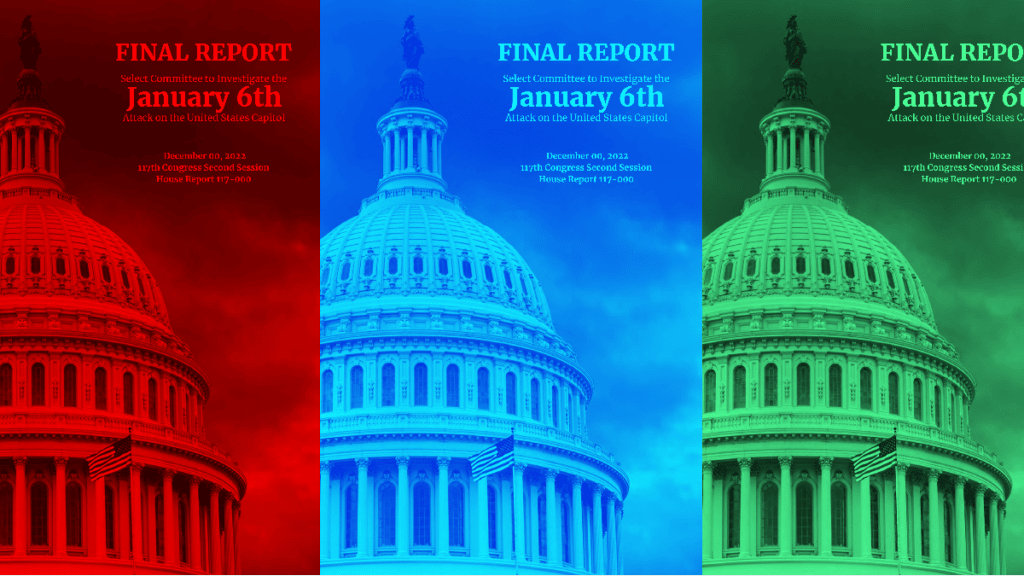The Final January 6th Report on the Role of Social Media
Justin Hendrix / Dec 23, 2022Justin Hendrix is CEO and Editor of Tech Policy Press. Views expressed here are his own.

This post is abstracted from an analysis of the Final Report of the Select Committee to Investigate the January 6th Attack on the United States Capitol published at Just Security.
According to the legislation that established the January 6th Committee, the members were mandated to examine “how technology, including online platforms” such as Facebook, YouTube, Twitter and Reddit “may have factored into the motivation, organization, and execution” of the insurrection. Almost a year ago, the committee issued subpoenas to Alphabet (Google), Facebook (now Meta), Reddit and Twitter demanding records “relating to the spread of misinformation, efforts to overturn the 2020 election, domestic violent extremism, and foreign influence in the 2020 election.”
“Two key questions for the Select Committee are how the spread of misinformation and violent extremism contributed to the violent attack on our democracy, and what steps—if any—social media companies took to prevent their platforms from being breeding grounds for radicalizing people to violence,” Committee Chairman Rep. Bennie Thompson (D-MS) wrote at the time. He indicated the subpoenas were issued because the companies had failed to voluntarily provide information useful to the investigation that the Committee had requested.
Now, in his forward to the January 6 Final Report, Rep. Thompson notes the Committee “pulled back the curtain at certain major social media companies to determine if their policies and protocols were up to the challenge when the President spread a message of violence and his supporters began to plan and coordinate their descent on Washington.”
The report is replete with references to the role that, in particular, Twitter played as a key channel for the former President and his supporters to advance false claims about the election and ultimately to call on crowds to travel to Washington D.C. on January 6. The central importance of Trump’s December 19th tweet (“Be there, will be wild!”) is made apparent. And there is substantial discussion of the role of fringe sites such as TheDonald[.]win and Parler in the organization of extremist groups and planning for violence, with reference to Just Security reporting, in particular, on TheDonald[.]win. There is a segment on the role of the QAnon conspiracy in animating extremists, mention of key social media influencers and organizers such as InfoWars host Alex Jones, and an appendix that addresses the role of foreign state actors in pushing disinformation and narratives intended to influence the electorate.
That said, there is very little in the Report concerning the types of considerations referenced in the subpoenas. The Committee makes no explicit judgment on whether the platforms themselves could have done more to address the spread of the Big Lie and festering extremism, either in the immediate runup to January 6 or in the years prior, during which networks such as QAnon emerged. Rather, the Committee includes in its recommendations an encouragement to congressional committees to continue to investigate these questions:
The Committee’s investigation has identified many individuals involved in January 6th who were provoked to act by false information about the 2020 election repeatedly reinforced by legacy and social media. The Committee agrees that individuals remain responsible for their own actions, including their own criminal actions. But congressional committees of jurisdiction should continue to evaluate policies of media companies that have had the effect of radicalizing their consumers, including by provoking people to attack their own country.
If the committee did collect more specific information from the tech platforms, such as internal assessments or other testimony beyond that of a former Twitter employee highlighted in the seventh public hearing in July, it did not appear to merit mention in the final report.
For more highlights from the Final Report of the Select Committee to Investigate the January 6th Attack on the United States Capitol, see Just Security, Important Elements of the January 6th Report, December 23, 2022.
Authors
